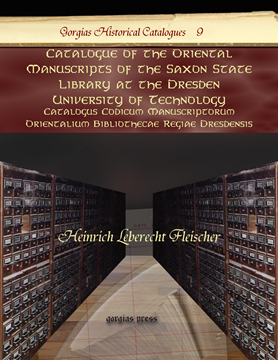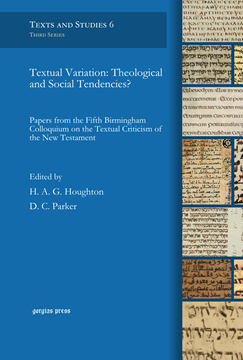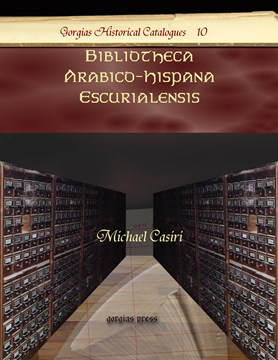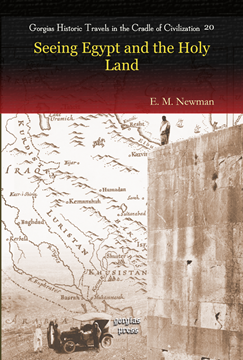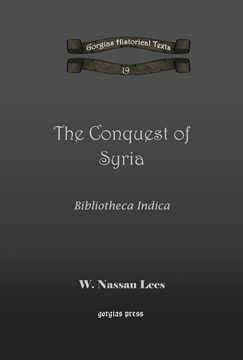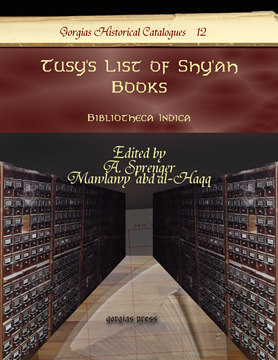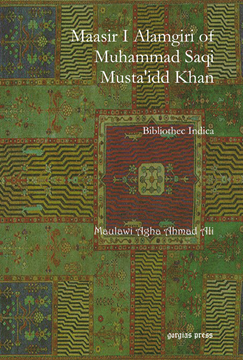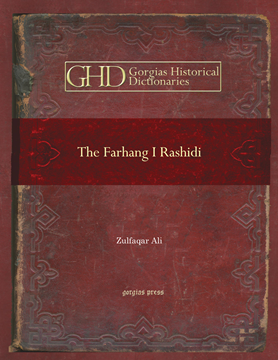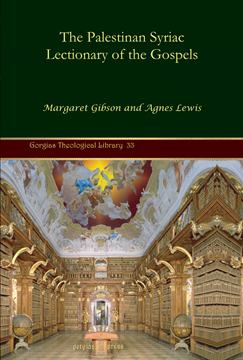Catalogue of the Oriental Manuscripts of the Saxon State Library at the Dresden University of Techno
Catalogus Codicum Manuscriptorum Orientalium Bibliothecae Regiae Dresdensis
Series: Kiraz Historical Catalogues Archive 9
ISBN: 978-1-59333-904-3
This historic catalogue documents the oriental manuscripts of what is now the Saxon State Library at the Dresden University of Technology. Formerly the Royal Library of Dresden, this repository houses numerous manuscripts from antiquity. Catalogued before the tragic bombing of Dresden during WWII, this historic record, written in Latin, briefly describes the nearly 600 documents in the collections of Dresden and Guelferbytan at that time. Valued more as a historical memento, this catalogue provides a sense of importance of the manuscripts housed in the library of the early 19th century capital of Saxony. Adding to the utility of his register are the indices to the codices included with the collection.
$123.00 (USD) $73.80 (USD)
Theological and Social Tendencies?
Papers from the Fifth Birmingham Colloquium on the Textual Criticism of the New Testament
Edited by H. A. G. Houghton & David C. Parker
Series: Texts and Studies (Third Series) 6
ISBN: 978-1-59333-789-6
Did scribes intentionally change the text of the New Testament? This book argues they did not and disputes the claims that variant readings are theologically motivated. Using evidence gathered from some of the earliest surviving biblical manuscripts these essays reconstruct the copying habits of scribes and explore the contexts in which they worked. Alongside these are studies of selected early Christian writings, which illustrate attitudes to and examples of textual change.
$135.00 (USD) $81.00 (USD)
Bibliotheca Arabico-Hispana Escurialensis
Series: Kiraz Historical Catalogues Archive 10
ISBN: 978-1-59333-908-1
Eager to preserve the Spanish and Arabic heritage, Miguel Casiri set out to catalogue the 1800 Arabic manuscripts in the Royal Monastery of San Lorenzo El Real, known generally by the title El Escorial. The resulting work was a monument of scholarship in the eighteenth century. Containing a number of quotes from Arabic sources on history, geographical and historical manuscripts, full text of both volumes, indicies, and subject divisions, this edition, part of Gorgias Historical Catalogues, serves as a historic and linguistic study, as well as a reference work.
$366.00 (USD) $219.60 (USD)
Seeing Egypt and the Holy Land
By E. M. Newman
Series: Kiraz Historic Travels Archive 20
ISBN: 978-1-59333-911-1
With the characteristic compelling photographs that accompany his work, E. M. Newman here presents his unique outlook on Egypt and the Holy Land. Written with the competence of a professional travel writer, Newman takes the reader through his arrival in Egypt by ship and on a virtual tour of the noted wonders of that land. His impressions of Egypt, Palestine, the Arabian Desert and Sinai are all dutifully recorded. Finishing up with the accounts of his main New Testament sites, Nazareth, the Jordan River, Bethlehem, and Jerusalem, this travelogue contains a wealth of impressions and memories. Illustrated with over 300 photographs, this volume gives a visually descriptive tour of these ancient lands.
$185.00 (USD) $111.00 (USD)
The Conquest of Syria
Bibliotheca Indica
Series: Kiraz Chronicles Archive 19
ISBN: 978-1-59333-913-5
A representative of the Arabic genre known as “futuh reports,” The Conquest of Syria remains an important historical source although it is now recognized not to be the work of Abu Abdullah Muhammad Ibn Omar Ibn Waqid al-Aslami (called al-Waqidi). This Arabic document, part history, part romantic reconstruction of the past, is one of the main sources narrating the Muslim conquest of Syria. A window into the world of early Muslim self-perception, these documents are a valuable historical source in the sense of being period pieces. Here the Arabic text is presented along with the partial notes and comments of W. Nassau Lees, a noted writer on Eastern culture.
$289.00 (USD) $173.40 (USD)
Tusy's List of Shy'ah Books
Bibliotheca Indica
Edited by A. Sprenger & Mawlawy 'abd al-Haqq
Series: Kiraz Historical Catalogues Archive 12
ISBN: 978-1-59333-914-2
Among the earliest important Shiite works is that of Tusy’s List of Shiites Books. This reprint of the first publication of the work bears all the marks of a primary source, and it was a work heralded by Islamic scholars of late antiquity. Also included in this edition is the new edition of a supplement to Tusy’s bibliography prepared by Alam al-Hoda. The notes from this text are replicated at the bottom of the page. A useful resource for scholars of ancient bibliography, this uncommon source of Arabic scholarship is now again available, in its original language, for the Arabic reader interested in the history of bibliography.
$181.00 (USD) $108.60 (USD)
Maasir I Alamgiri of Muhammad Saqi Musta'idd Khan
Bibliothec Indica
ISBN: 978-1-59333-915-9
Written in the original Persian, this account of the reign of the Mughal emperor Aurangzib-Alamgir (reigned 1658-1707) is a standard resource for the this final great ruler of the empire. The chronicles of the emperors of this period in India are in general a blend of biography and history, but in the case of Aurangzib, the emperor is portrayed in terms of unstinting praise. Comprising both official sources, such as court circulars and letters, and personal recollections, the work was initiated by Mirza Muhammad Kazim, put aside until after the Emperor’s death, and completed in 1710 by Saqi Must`ad Khan.
$238.00 (USD) $142.80 (USD)
The Greek-Turkish War 1919–23
An Australian Press Perspective
Series: Conflict and Trade 1
ISBN: 978-1-59333-967-8
The book describes different facets of the Greek-Turkish conflict (1919-23) through the eyes of of the Australian press. Australia’s national identity was forged on the shores of the Gallipoli Peninsula fighting against the Ottoman Empire in 1915. After the war, Australia stayed involved with that area of the world as it sought to chart an 'independent' foreign policy within the framework of the British Empire. This book discusses the role that Australia's press played during that conflict and how it shaped Australian nationalism and identity going forward.
$175.00 (USD) $105.00 (USD)
The Farhang I Rashidi
A Persian Dictionary by Sayyid Abdurrashid
By Zulfaqar Ali
Series: Kiraz Historical Dictionaries Archive 20
ISBN: 978-1-59333-916-6
The famous Persian dictionary of Sayyid Abdurrashid, now quite difficult to locate, is an historic dictionary to which linguists still make reference. The Farhang I Rashidi was compiled by the Persian scholar Abd ur-Rashid bin Abd ul-Ghafur Husaini al-Madani al-Tattawi (d. 1653) who lived in Thatta, now the Sindh province of Pakistan. One of two dictionaries compiled by Abd ur-Rashid, this lexicon, presented entirely in Classic Persian, marks a turning point in Persian lexicography and ranks as one of the cultural and literary achievements of the seventeenth century. The two volumes of this historic dictionary are here bound together, providing an affordable alternative to earlier two-part editions.
$257.00 (USD) $154.20 (USD)
The Palestinan Syriac Lectionary of the Gospels
Series: Kiraz Theological Archive 33
ISBN: 978-1-59333-917-3
The work of the remarkable sisters Agnes Smith Lewis and Margaret Dunlop Gibson, this lectionary of what is now known as Christian Palestinian Aramaic, was re-edited in the light of two manuscripts from the Sinai, which they recovered, and from Paul de Lagarde’s Evangeliarium Hierosolymitanum. An important document for the textual criticism of the New Testament as well as for the early practice of the church, Lewis and Dunlap added to its value by composing this light “critical edition.” Presented in Syriac with English annotations to the Greek text of the Gospels, this useful study will be welcome by New Testament scholars and Syriac scholars alike.
$181.00 (USD) $108.60 (USD)
